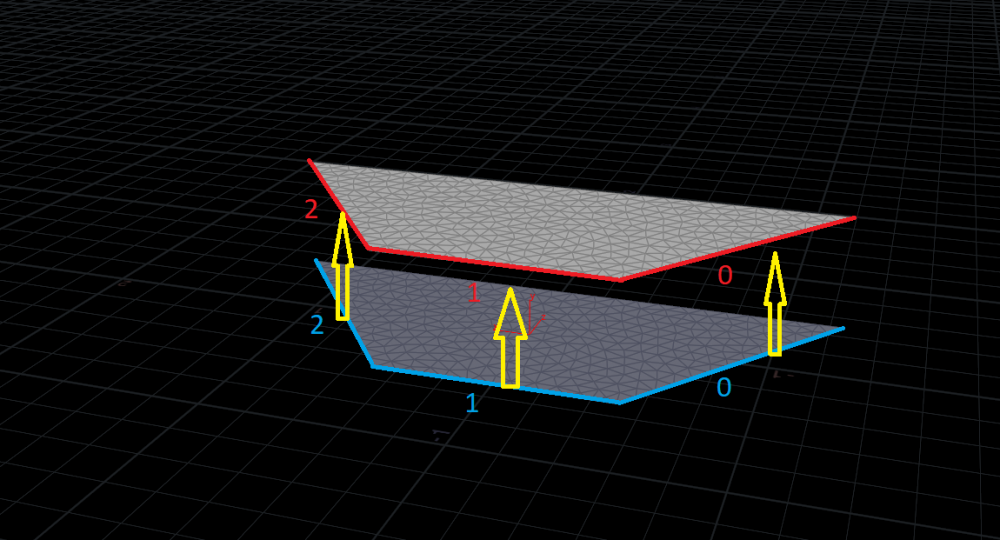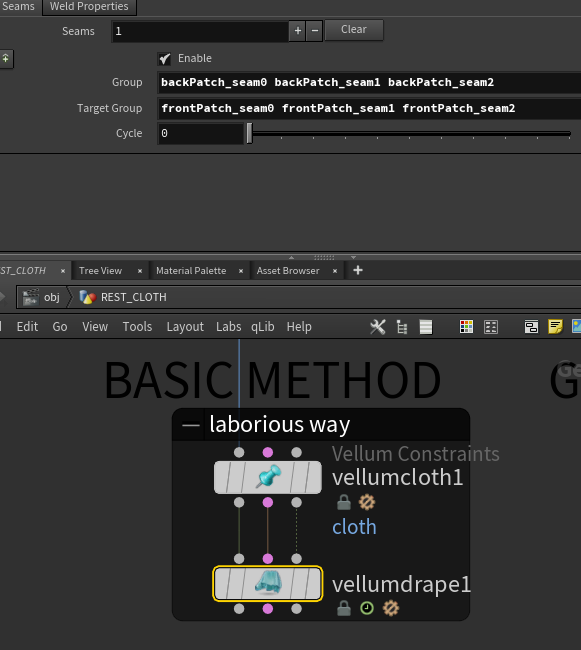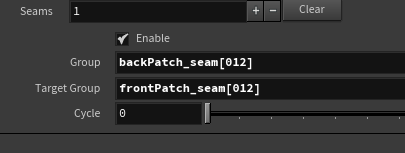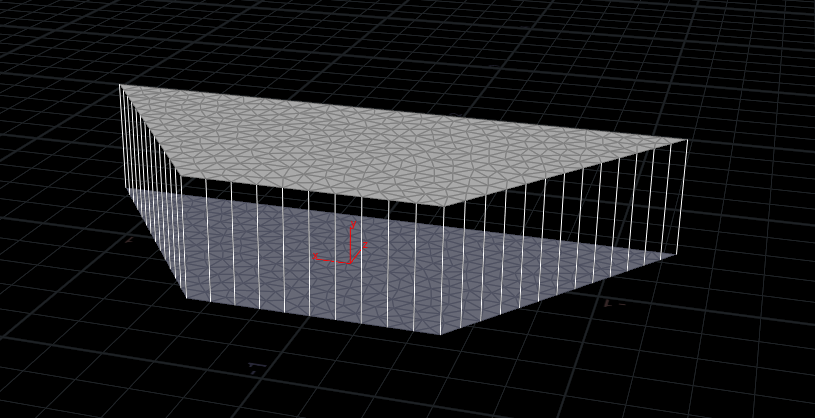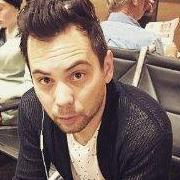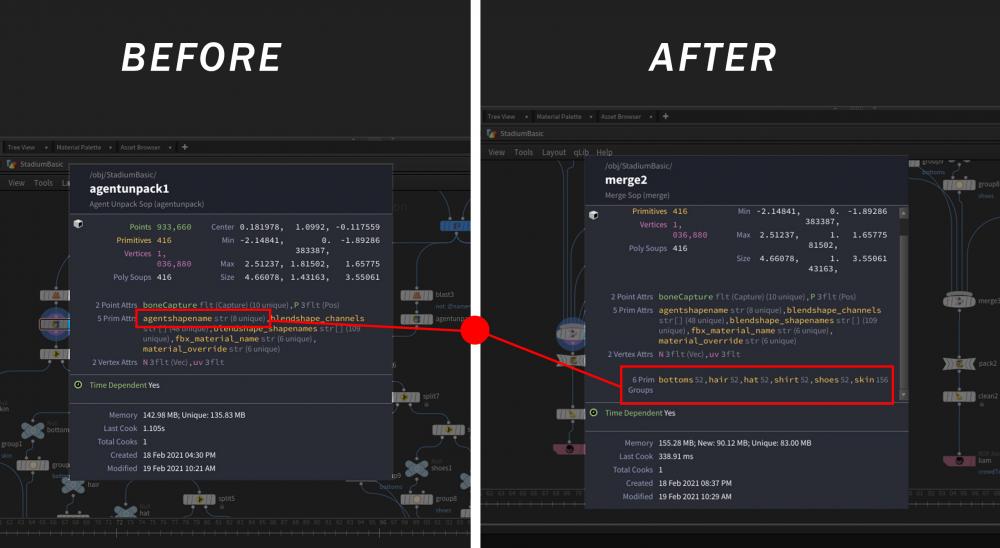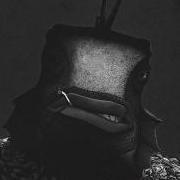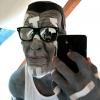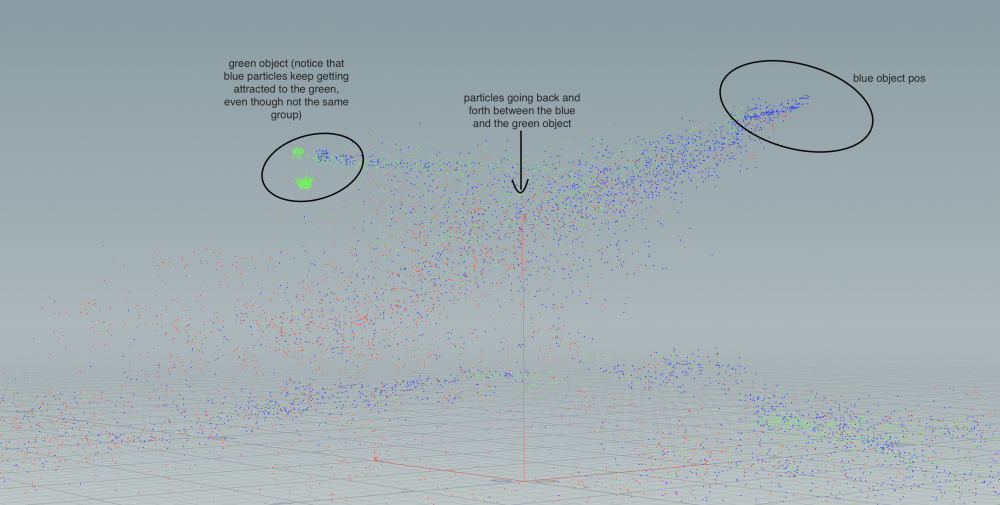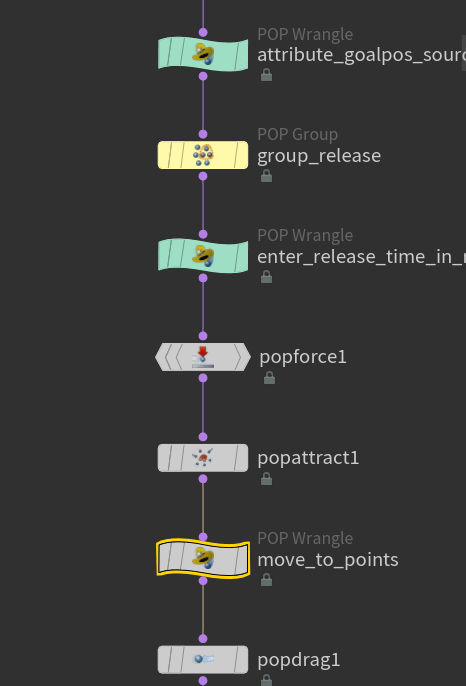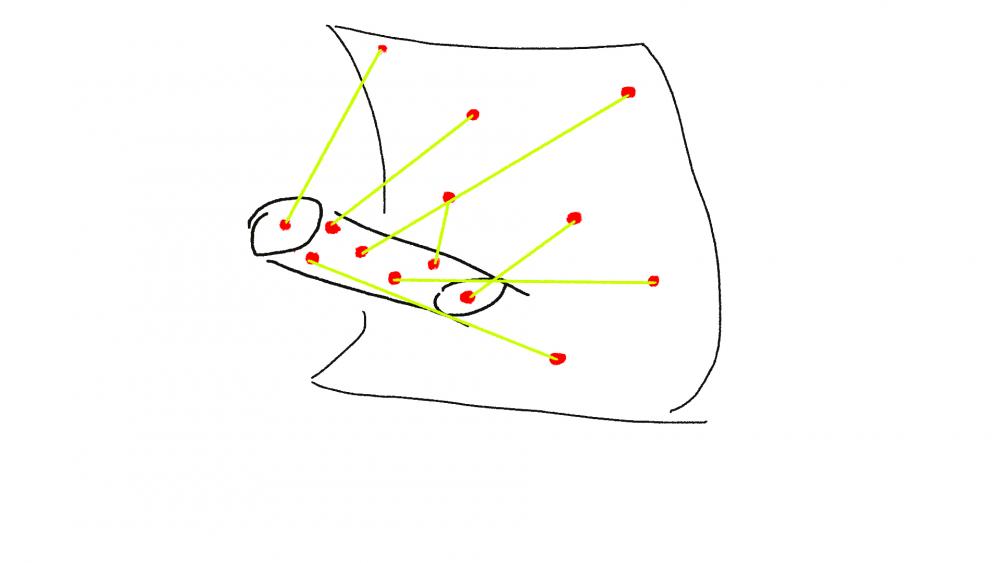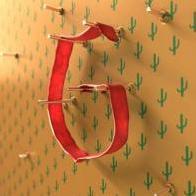Search the Community
Showing results for tags 'groups'.
-
I'm still newish to Houdini, so please bare with me. I'm trying to create walls between multiple watertight objects of uncertain shapes, which are guaranteed to have space in between them, but which are still close together. My first idea was a 3D Voronoi structure kind of solution, a bit like this: But instead of walls between every neighboring points, I would fill the geo with points, give them groups, and then only create walls between points of different groups, like this: Is there a nice way to get this? I tried to use the Voronoi Fracture Sop and to promote the points in a group to primitives and blast them, but this doesn't select all primitives. I'm also very open to different solutions! Thanks!
-
Hi everyone ! I made an example .hip file below if you need ! I have a vellum patch and I want to drape it. I can select the groups in the old fashion way by selecting the needed groups one by one in the Vellum Drape node. But when it goes to very large pieces of vellum, it can be very laborious. My question is: Is there a way to select to tell the Vellum Drape, "select all the groups between backPatch_seam0 group to backPatch_seam2" ? I can share what I found until now though ! We can write this in the Vellum Drape node: "backPatch_seam[012]" and it selects the groups with the indicated suffixes between "[]". But as you can imagine, it doesn't work if the seams you want to select are numbers like 13 ; 78 ; etc... because this expression understand only the digits in these numbers (13 becomes 1 & 3 ; 78 becomes 7 & 8). Is there a better method to accomplish that ? Here is a .hip file if you want to try: Select A range of groups.hip
-
Hey all, In the past I've set up primitive groups and then applied forces to specific vellum objects inside of the vellum solver. However, the same set up isn't working in houdini 19 for some reason, did something change? File attached to illustrate what I mean. Thanks!! VellumGroupTest_v01.hiplc Edit: Looks like Pop Speed Limit requires a point group
-
- houdini 19
- groups
-
(and 1 more)
Tagged with:
-
I'm working on a POP simulation for a rainy window and I've set up the simulation so that source particles (in yellow) fall with erratic motion due to a varying POP Wind force and Gravity force, emitting a stream of particles behind them (in green) as they fall using POP replicate. The emitted particles are stopped immediately after emission (using the stopped attribute in a POP wrangle). The issue is that as soon as the POP replicate is activated (at frame 200 in the video), the erratic motion of the source particles is lost and they travel more slowly in straight diagonal lines (as the trails of the emitted particles show). I believe that the POP interact node is causing this as the source particles are being attracted to the stationary emitted particles, slowing them down. But what I don't understand is that the POP interact and replicate are in separate particle streams so the emitted particles shouldn't have any effect on the source particles. I've attached a hip file along with a video illustrating the change in motion when POP Replicate is activated. Any help would be much appreciated as I'm pretty stuck on this! Thanks Houdini_POP_Replicate_Question.mp4 POP Replicate Issue.hip
-
I'm currently working on a POP netowork to simulate raindrops on a window, and am trying to isolate the original particles from which the trails (in red) are emitted as per an emit attribute using the POP replicate node, so that I can selecting apply a POP interact force to them. However, I'm really struggling to find a way to isolate those points. I couldnt find any reference to the original points within the POP replicate node, apart from the fact that their ID is added to the sourceptnum attribute. Am I missing an obvious solution? Thanks
-
Happy Friday, I'm currently working on a project where I need to export alembics assets into C4D. The assets I want to export have embedded Prim attributes that I want to convert to Prim groups in order for the artist to have control of the material selections in C4D. Currently, I'm splitting all the attributes and converting them to groups manually which is time-consuming and can break. Since I'll be modifying and making adjustments I was wondering if there was a more procedural way of doing this through a wrangle or possibly the partition sop? Any help would be greatly appreciated, thanks!
- 5 replies
-
- groups
- attributes
-
(and 3 more)
Tagged with:
-
I am trying to create some groups from a "guide groom" node so I can apply different kinds of hair generate later and give more variation to it. How can I get the guides randomly and create the groups from it?
-
Hi, I am scattering two different objects and changing their points for cubes, I am merging them to a DOPNET with rbdpackedobject and blletrbdsolvers. Everything collide with each other it's great but when I export my alembic, with the ROP alembic and import into Cinema4d, I have a full list of objects mix up together. Is there a way to tell my alembic that there is two different groups of objects, so then iside c4d I can apply my materials straight away? I am stuck with this one, Many thank. R.
-
Hi, I'm a relatively new user so forgive me if this is a trivial problem I'm trying to sort my mesh according to regions of similar curvature. My aim is to be able to iterate over each region and remesh it smoothly— Ideally, in a way that would preserve boundary points and leave the mesh water-tight. Below is a link to the work of a Houdini artist whose procedure I'm trying to reproduce on my own meshes. Any help or a nudge in the right direction would be much appreciated. I've attached a very simple hip file illustrating what I'm trying to accomplish. Thanks so much! Measured Partitioning_test.hiplc
-
I'm not sure if my workflow is incorrect but I have found something a little odd with transferring groups with the Assemble SOP. I was doing a sim and needed to use the rbdconfigure to set the active area. After that node however, some of my primitive groups I use to texture were either empty or had the wrong amount of primitives in them. I googled around and found that most solutions were to make sure the Assemble SOP was transferring the groups. However the only thing that got it to work was to make sure the Transfer Groups field was completely empty... I had to unlock the rbdconfigure HDA and clear the fields. Now I have all my groups and everything is working fine... As I said, not sure if I did something wrong further up the chain but maybe this is a bit of a PSA for anyone finding a similar issue.
-
Hello! I'm stuggling with texturing my crowd. Random texturing for the agents themselves works fine, but I've added shapes which I can't adress in the stylesheet. It seems like I'm loosing my primitive group when adding the shape to the agent layer. So my question is: How to keep the shapes primitive group when adding to the agentlayer? Or am I missing something and there is another way of applying (random) textures on the added shapes?
-
Hi, Probably easy question, but what would be the way to make this vex code shorter and work for more @id`s, so I don`t have to copy the same line of code multiple times? if(@fid == 0) i@group_fid0 = 1; if(@fid == 1) i@group_fid1 = 1; if(@fid == 2) i@group_fid2 = 1; if(@fid == 3) i@group_fid3 = 1; I basically want to make a group for all primitives with same id. I`m guessing it can be done using arrays, but I`m not too good with them. Thanks Janis
-
Hi guys (and gals)! How can I split the scattered points of a geometry into three groups, depending on the scattered points position to three different objects? I have tried with point clouds, with nearpoints and everything I could imagine, but I can't seem to figure it out! It either relies on radius, or doesn't sort correctly. I also tried with the sort node but it really messes with my sopsolver which is used for the infection down the stream.. To better explain the situation, lets say I have the geometry I want to split scattered with 10 points, and the point targets I want to use as refs have 2, 4, 4 points respectively. How can I "sort" the scattered points to either belong to group 1, 2, or 3 explicitly, depending on the distance from the point targets? Each point should belong to one group and one group only. And the sorting only has to happen in the beginning of the sim, after that pop forces take over. If anybody has any idea, please, feel free to share! Thank you for your time, G.
- 3 replies
-
- point cloud
- proximity
- (and 4 more)
-
Hi guys! I have a problem that's been bothering me for a couple of days and I can't seem to wrap my head around to solve: I have a grid, with scattered points. And I have 3 objects hovering above the grid. With a colour shift on the grid (attribute transfer with an animated ball for now), I "activate" the points in a pop network, and I start adding forces on them, choreographing them, until they reach a certain age and start to move to the 3 objects above, like an attraction (point count is the same in both inputs for simplicity - also I have colour grouped which particles belong to which object for visualisation purposes). So far so good. The problem is that in theory, each $id should correspond in each point on the objects above - but alas, they seem to shift groups! So, instead of clean motion / attraction on each of the objects after a specific time, I get more of a random mass of particles moving back and forth the objects until the end where they stick on the objects. There sure is something wrong with my vex, but I cannot understand what! It should be easy: green goes to green, blue to blue and red to red.. Attached are some images to help understand the problem. the viewport describing the problem: the pop hierarchy: the wrangle to move the points to position after a certain amount of time in the "time_in_release": If anybody has any idea as to why this is happening, please, feel free to share! I would be more than grateful to hear your thoughts! Thank you so much for your time, G.
-
I'm attempting to create a polygon ribbons out of multiple streams of particles emitting from points moving around on a surface. I've been having a lot of trouble sectioning the streams into separate groups, so that I can use the add node to add polygons down the chain of particles. I'm not even sure if this is the best way to go about it. I'm using a popnet to create the points moving around the surface of a sphere, which I'm then plugging into another Popnet to emit the streams of particles. In the 'pop_trailsCreation' popnet, I have my emission type set to points. Does someone have a clue how I can create a polygon ribbon / tube moving down each separate stream of Particles? I've been trying to separate each stream based on the @id of each source_point, but I've had no luck in achieving that. Many thanks!!
-
Does anyone have a solution? how can i connect the in and out group to each other without any other connections?
-
Hello Odforce, I'm trying to create groups based on the @P.y attribute of a bunch of vertical lines I have. I am almost there, but I'm not exactly a Vexpert and can't figure out exactly how to assign multiple groups with different names. I'm able to create a string attribute with the correct name for the groups with s@test = sprintf("%f", @P.y); s@groupname = concat("group_", @test); I tried using setpointgroup(0, @groupname, @ptnum, 1, "set") after this, but it didn't do anything, now I'm just stumped on how to approach assigning this attribute as a group. Any input would be greatly appreciated! Thank you
-
Hey, I have been trying to create groups from FBX subnet, which can be accessed after the crowd simulation done. So I can apply different base colors through Material Style sheet and I am also curious to know if I can export different groups of object to other 3D packages if I have to render it there. what I want to do is, I want to create primitive groups which can be accessed after unpacking the agent SOP. So I can access that data for further process. I somehow manage to make the groups based on the shaders applied to particular objects, but some of the shaders were not included in the groups, I would like to have a proper work around for this. Or is there any particular method to make groups during exporting the fbx from maya ? Thank you All.
- 1 reply
-
- crowd
- material stylesheet
-
(and 5 more)
Tagged with:
-
Hi Everyone I'm currently trying to create circular point groups, inside a voronoi fracture. My outputs are groups currently are primitives but when I conver them to points, i have to many clustered together. I'm thinking of a solution by either getting the max/min two points of each primitive inside my group and delete the other points from the group. Unfortunately my VEX skills are very limited, I seem to be declaring my max function wrong. If someone could help me figure it out that would be great, also an explanation to why my attempt didn't work/ any other solutions towards achieving the same result would be more than welcome. Cheers Example.hipnc and for any questions im trying to make a tool that creates ground slams, as you can see there's distinct circular fractures which im trying to replicate, but also make procedural.
-
Hey Everyone! So the issue is... I am using Voronoi to fracture an object. The inside and outside faces are in two groups named 'inside' and 'outside'. I'm using the 'assemble' node to pack the primitives however, doing this, it looses the 'inside' and 'outside' groups which I need to use later on. Is there a way to use the assemble node and keep the groups? Any advice is massively appreciated! Thanks All!
-
In older versions of Houdini I could add a point to a group's selection. Has that changed in H16 because I can't seem to get it to happen? Any advice would be appreciated. Thank you David
-
I think this is prolly an easy answer and I know I should know this. I have a pop net and I have to points enter a group based on the age, and once they are in that group a pop force takes over. but as of now they kinda pop as soon as that force takes over. is there a way to ramp into that group rather than it being an on or off so there is a smooth transaction into the pop force. Thanks for your suggestions in advance!! Rob
-
Hi, I have a list of groups that was generated by a copy SOP. The listed was created as follows: pointgroup_0_2, pointgroup_0_3, pointgroup_0_4, and so on. How do I delete only the even number groups? Please help. Advanced thanks!
-
Hi Got a newbie question. I am saving out a RBD SIM from Dops using a dop import as points and then using transform pieces to load them back in. For some reason the groups are not being saved out and I cant figure it out. The last point I see the groups when i middle mouse is the out constraint null which is going into the constraint network. When i load the saved files i see no groups. Thanks



